Harvesting tomatillos is easy once you learn exactly when and how to do it. In this post, I’ll show you how to tell when tomatillos are ripe, the best way to pick them, and where to store them.
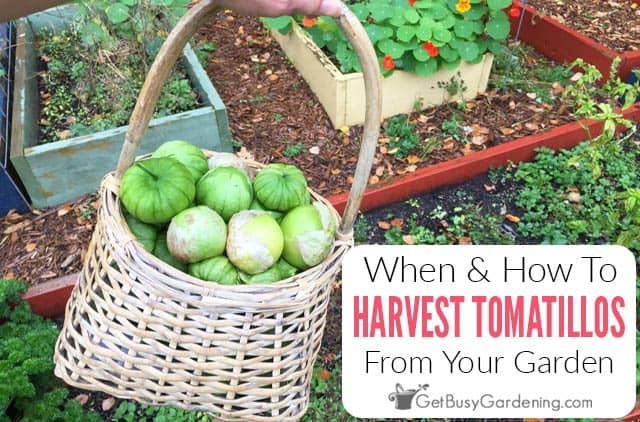
The steps for harvesting tomatillos are very simple! However, since they don’t usually change colors when they’re ripe, it’s hard to know exactly when to pick them.
It’s important to get them at the right time. If you gather them too early, they won’t be as sweet. But if you leave them on the plant for too long, they could crack or start to rot.
In this tomatillo harvesting guide, you’ll learn all you need to know so you can easily tell when they’re ready, and also how to properly pluck them. I’ll even give you some storage tips.
What Does A Ripe Tomatillo Look Like?
Probably one of the hardest things about harvesting tomatillos is that they don’t really change colors when they are ripe.
Sometimes they can turn a tiny bit yellow when they’re ready. But for the most part, they stay green the whole time.
Don’t worry, it’s actually easy to tell when it’s time to pick them. You just have to know what to look for (and don’t let them trick you).
When To Pick Tomatillos
Tomatillos start out as cute lanterns or balloons (called husks). Sometimes these little lanterns will get huge long before the fruit inside is mature.
When that happens, you might think they’re ready. But one quick squeeze, and you’ll discover that the husks are empty. Yeah, they like to trick us!
One sure way to tell they’re ready to pick is when the outer husk splits open, and it looks like the fruit is busting out.
The husk may turn brown and papery once it splits open, or it might stay soft and green. Either way, a tomatillo is ready to harvest once the husk splits.
Another way to tell is when the husk turns brown, and becomes thin and papery. Once this happens, it means they’re ripe, even if the husk doesn’t open.
Tomatillos can also be harvested when they’re small, before the husk turns brown or splits open. They just won’t be as sweet.
So, if a hard freeze is coming, you can pick all the ones that are left on the plant, and still use the small ones for your recipes.
Related Post: How To Grow Tomatillos At Home
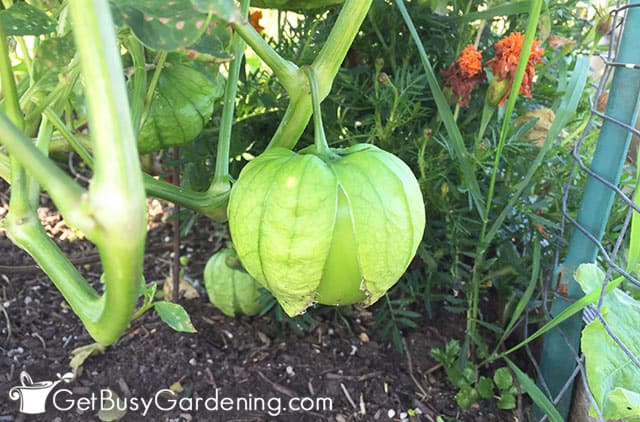
How To Harvest Tomatillos
Once you determine that a tomatillo is ready to harvest, it’s best to cut it from the plant rather than pulling it off.
But many times they will come off the vine easily with a gentle twist. Just don’t tug or force them from the plant, or you could damage the stem.
Take care to gently place them into your collection bucket or basket, rather than dropping or tossing them in. Mishandling them could cause the skins to crack, or it can bruise the fruit.
Related Post: How To Can Tomatillos
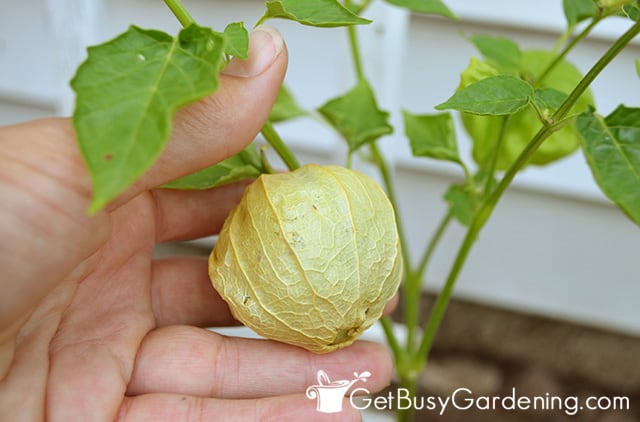
How Often To Harvest Tomatillos
You can harvest tomatillos any time they are ready. If you live in a cold climate like I do, you’ll probably get the bulk of your yield in late summer through fall.
You could start seeing them ripen much earlier than that though. So, check on your plants regularly, and pick off any ripe ones as they appear.
Related Post: How To Freeze Tomatillos (With Or Without Blanching)
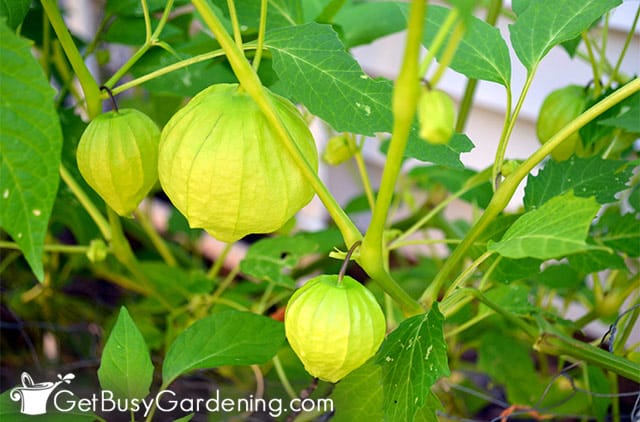
What To Do With Tomatillos After Harvesting
You can use freshly harvested tomatillos right away, or you could refrigerate them. They will stay good in the fridge for 2-3 weeks.
Otherwise, freeze them for longer term storage. Just remove the husks, and pop them into a freezer safe bag. That way you can enjoy them all winter long!
Related Post: How To Grow Tomatillos From Seed & When To Plant
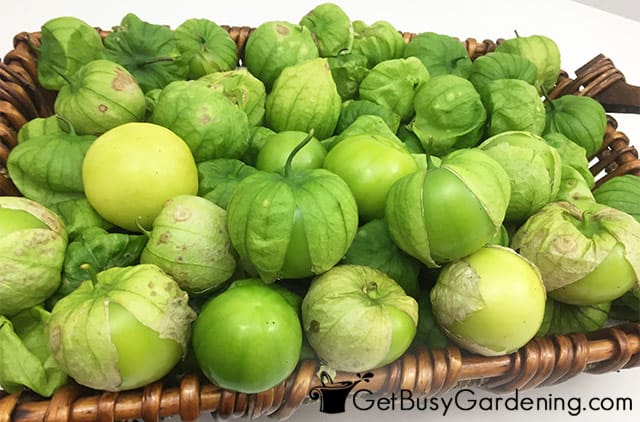
FAQs About Harvesting Tomatillos
You may still have some questions about picking tomatillos. Below are answers to a few of the most common. But if I haven’t answered yours here, then feel free to ask it in the comments below.
Can you eat unripe tomatillos?
Yes, tomatillos don’t need to ripe in order to use or eat them. The small, unripe fruits are just fine to eat. However, they are not as sweet and flavorful as the ripe fruits are.
Why is a tomatillo husk empty?
If the husk around your tomatillos is empty, the fruit simply hasn’t started forming yet (or it’s super small). The husk grows before the fruit, and will stay closed until it is ripe and ready to harvest. Just be patient.
Can you harvest tomatillos early?
Yes, you can harvest tomatillos at any time. In fact, if it is about to freeze outside, I recommend picking any that have developed so they won’t be destroyed.
However, they tend to be harder, and not as sweet when they are small. So it’s best to allow them to ripen on the plant whenever possible.
Harvesting tomatillos is easy, but the trick is knowing how to tell when they are ripe. Once you learn what to look for, you’ll know exactly when to pick them for the freshest and sweetest flavor.
If you’d like to learn how to make the most of your space and get as much homegrown food as possible, then my Vertical Vegetables book is perfect! It will teach you all you need to know, has tons of gorgeous photos, and includes 23 DIY projects you can build for your own garden. Order your copy today!
Learn more about my Vertical Vegetables book here.
More Garden Harvesting Posts
- When To Pick Tomatoes & How To Harvest Them
- When & How To Harvest Kohlrabi
- When & How To Harvest Potatoes
- When & How To Harvest Brussels Sprouts
- When & How To Harvest Squash
- Free Garden Harvest Tracking Sheet & Guide
Share your tips for harvesting tomatillos in the comments section below.
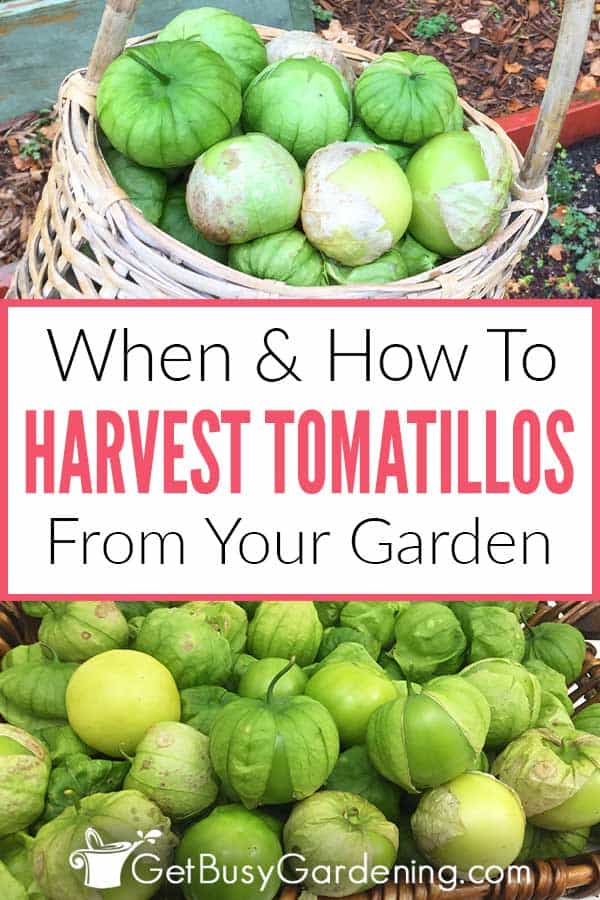
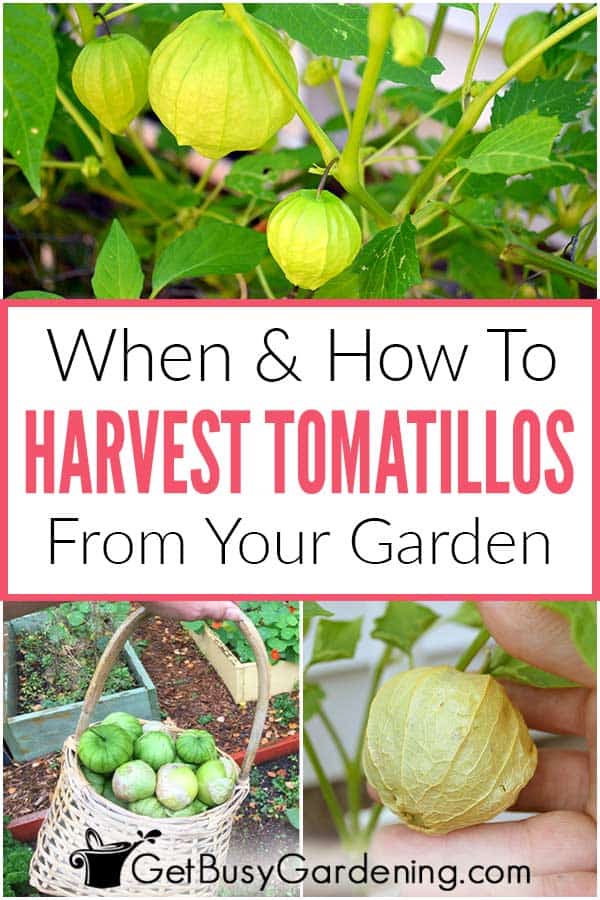
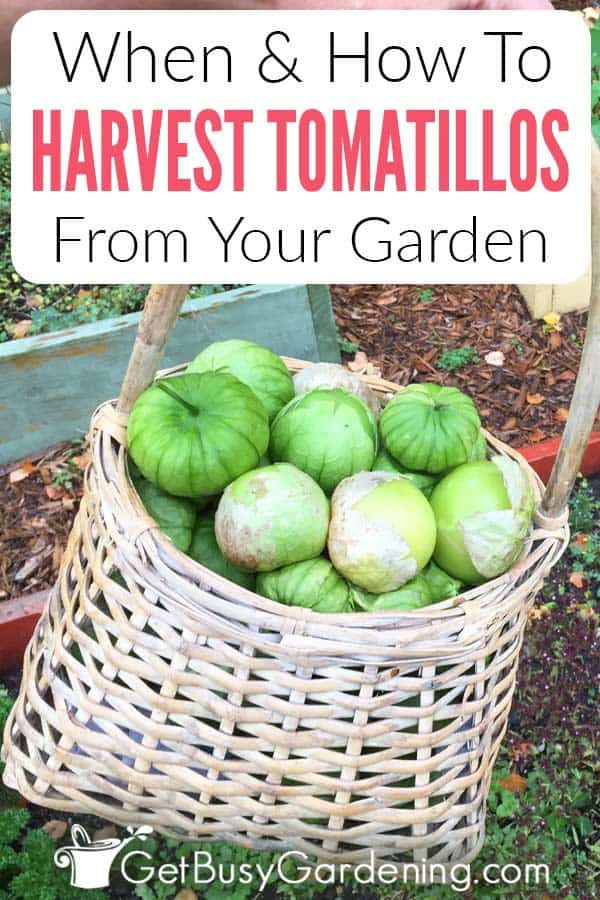



Mel says
If you picked them a little to early, is there a way to help them ripen? Thanks!
Amy Andrychowicz says
Tomatillos won’t ripen off the vine if they are too small. But, you can eat them at any size, the smaller ones just won’t be as sweet.
Barb M. says
Thanks for info! So, you say you pick ALL the remaining tomatillos when frost threatens? That’s including those that are only half the full size in the pod, say down to the size of large olives? I keep reading that the very small undeveloped ones are toxic, poisonous, etc.
I have a lot of them ready to pick, but also a pile of those quite underdeveloped ones that I’d like to use if safe. We don’t have a long growing season here in Michigan’s Upper Peninsula. If the weather holds, it will frost Friday night (9/27) and that’s a fairly late frost for us!
Amy Andrychowicz says
Tomatillos are in the nightshade family, along with eggplants, potatoes, peppers and tomatoes, all of which contain the toxin you’ve heard about. The leaves and stems of the plant have a much higher concentration of the toxin than the fruit, which is why these vegetables are edible (but no other part of the plant is). I’ve also heard that wild tomatillos may have a higher level of the toxin than cultivated varieties, so it might be wise to do more research about those before eating them. I’ve never heard of small, undeveloped tomatillos being more poisonous than mature ones, so I can’t speak to that. However, if you have an allergy to the nightshade family, then you will likely have a problem with eating tomatillos. I will say that I harvest immature tomatillos every fall before frost, and have eaten them many times myself without any issues. I don’t pick them as small as the size of an almond. I only harvest the ones that are about 1/2 the mature size or larger.
Aileen Noll says
Thank you for the information. I actually grew tomatillos by slicing and planting the slices in soil. I have an amazing plant. It is producing like crazy. Now I know when to harvest. Thank you.
Amy Andrychowicz says
Wow, that’s fantastic! LOL. Great to hear your tomatillo plant is going to give you a great harvest this year! 🙂
MICHAEL NAGLE says
They are sweeter and smoother, without the tart, edge if you wait until they turn yellowish before harvesting. I LOVE tomatillo salsa, made with jalapenos and onions, equal amounts of all three, broiled until just charred, cooled and ground up in the blender. The best!!
Amy Andrychowicz says
Interesting, I’ve never had any of my tomatillos turn yellow before, even after they stay on the plant longer than I would normally harvest them. Thanks for adding your tip! Your recipe sounds great, though I bet it’s very spicy! 🙂
Jay Johnson says
I’m originally from Boston, moved to Chicago and then I heard of Salsa Verde. I don’t eat hot spicy food. But I’m a hotel Controller who works with many Hispanics. You should see their eyes light up when they see me coming in with bags full of Seranno peppers, jalapeno’s, Tomatillos, Sport peppers, cucumbers, Cherakee Purple Heirloom tomatoes, Zuchinnis.
This year they also get Carolina Reapers!
They all live in apartments and don’t have gardens, so, I like to garden, they like fresh!
Amy Andrychowicz says
Fantastic, sounds like a win-win situation to me. 🙂 P.S. Tomatillos aren’t spicy at all, they’re very mild and sweet. But maybe you were talking about the peppers being spicy.
James says
I’ve been trying to grow tomatillos for a couple of years, but this is the first time I’ve actually succeeded. I have three large plants now, two in the ground in cages, and one in a container. All the plants are full of fruit, but none of them have grown large enough yet to fill the lanterns. I’m not sure what I’ll do with them yet, but they will probably get used in tomato dishes, salsa, stir-fries, curries etc.
Amy Andrychowicz says
Yes, there are tons of great recipes that you can use tomatillos in, yum!! So happy for you that you finally have had success growing them this year! Great job.
Dionne says
My first time growing tomatillos also. I purchased two small pots with plastic ID’s stating they were ‘Heritage Tomatoes’! The leaves looked different but I didn’t think much about that. UNTIL, they began producing these
strange little lanterns! I thought they were ‘Japanese Lantern’ plants, so just watched them in amusement until
they became so large I had to pop tall strong tomato cages (manufactured from fencing rolled into ‘tubes’) over
each plant.
Friends told me they are tomatillos, which I have never tasted before, although I have seen them in markets. So grateful to find harvesting suggestions, I had no idea what to do with them before. There is also a site with many recipes offered. I saved that site also because my two plants are to the tops of the cages and far beyond, so are over six feet tall. They are both absolutely loaded with fruit, so I should be able to try all the recipes offered.
Thank you for your very helpful information on how to determine when to harvest, and for advising us that ALL of
the fruit, ripe or not, may be picked and used preceding a freeze. That should save a lot of tomatillos because there must be at least 80 or 90 on each of my two plants. I plan to share a lot of them with neighbors.
Amy Andrychowicz says
Awesome! What a surprise for sure, LOL! They are very prolific plants. You’re welcome, and enjoy your bountiful harvest!
Sahana says
Thank you for the tips on harvesting Tomatillos!
Amy Andrychowicz says
You’re welcome!
ida M. Cordova says
Are tomatillos good to eat when the fruit turns yellow. They seem firm and the shell is brown.
Amy Andrychowicz says
There are some varieties of tomatillos that are yellow, so I’m guessing that’s what yours are. 🙂 Yes, when they turn yellow, that means they are ripe and ready to harvest.
CherGoes says
Well, this is my first year ever growing Tomatillos…
Growing some in the ‘traditional’ in ground method, where
They’ve only grown to approximately 1.5 to 2 feet tall.
I am also growing 2 different varieties in just 5 gallon Root Pouches, and the ones in the bags have so far grown to almost SIX feet tall!!!! AND they’re LOADED with fruit that are just about ripe!!!
They are amazingly beautiful plants!
We have never eaten Tomatillos before… But I think that even if we don’t like them… I’m going to grow them, JUST for their beauty and the fact that they are major pollinator magnets… And SELL the fruit! Lol???
Amy Andrychowicz says
Haha, awesome idea! I think you’re gonna love them though. They’re excellent for salsa and other sauces you can make for Mexican dishes, there are tons options for using freshly harvested tomatillos in cooking!
Lou Beaudette says
My first year growing these little beauties! I need to add more support as The plants are prolofic producers and they are weighing down the branches. Wondering how long they will keep in my pantry before I have to start ptocessing them? Do they ripen like a tomato in the dark? Do they stay green? Need some recipes now to make some salsa and whatever else they are good for?
Amy Andrychowicz says
Yes, they will need support for sure! I use wire tomato cages to support my tomatillo plants, they work great! Tomatillos will stay green, and won’t ripen like tomatoes. You can eat a tomatillo at any size, so in the fall I just harvest everything that’s left on the plant and use it in recipes like salsa and sauces.
Bruce says
Great information on when to harvest the tomatillos. I’ve always been uncertain as to whether to wait for the lantern to turn brown before harvesting. But I live in Washington State and the lanterns never seem to turn brown.
We harvest anyway and cook them like you would fried green tomatoes. Yummy!
I’m going to try freezing some of them this year. Thanks for the info.
Amy Andrychowicz says
You’re welcome! Yep, we harvest tomatillos young too, they’re good to eat even when they’re small. Enjoy!
LaWana Meade says
This is my first year growing tomatillas. I bought a plant from a store. I planted only that one plant. My plant probably has 200 tomatillas on the plant. Had no idea it would yield that many. If they all do not ripen before our first frost can I bring them inside to ripen?
Amy Andrychowicz says
How fun!! They are prolific plants, aren’t they? Love it! You can actually use tomatillos when they’re small too, just like you would use them when they’re ripe. They’re sweeter when they are ripe. I always harvest everything that’s on the plant before frost, and then I use them to make sauces and salsas. I freeze the sauces and either can the salsa, or eat it. 🙂 Yum!
Ellen Peavey says
This is my first year growing tomatillo’s I planted eight plants didn’t realized how big they would grow. Thank goodness I put tomato cages over all of the plants early they have already out grown those cages and wandering into the tomato plants. Now I know what to look for when getting ready to pick the tomatillo. I’m going to check them this morning thanks for the information. Ellen from Georgia
Amy Andrychowicz says
Haha, yes I had the exact same thing happen to me! They get huge!! You’re welcome, happy I could help. 🙂
Mike the Gardener says
I grew tomatillos a couple of years ago and they did great. My neighbor is much better with them than I. He also makes a great tomatillo salsa that is fantastic with a whole wheat cracker.
Amy Andrychowicz says
Yum, I love tomatillo salsa!!